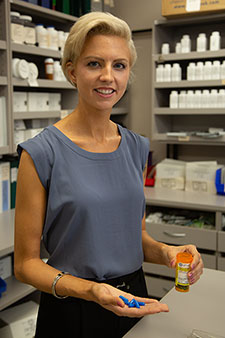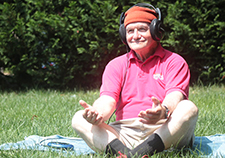Office of Research & Development |
 |


Hemp and marijuana both refer to the cannabis sativa plant and its products. Different varieties of the plant, however, can contain different levels of chemical compounds, and that is what distinguishes hemp from marijuana. (Photo: ©iStock/Nastasic)
February 5, 2019
By Mitch Mirkin
VA Research Communications
Researchers at the VA San Diego Healthcare System aim to see whether cannabidiol, or CBD—a compound derived from cannabis plants—can help ease PTSD. The study will give CBD as an add-on to prolonged exposure therapy, a proven psychotherapy for PTSD.
The $1.3 million VA-funded study will enroll 136 Veterans, from all service eras.

Dr. Mallory Loflin is leading a VA study in which Veterans with PTSD will receive capsules containing CBD—a compound derived from cannabis—or a lookalike placebo, along with evidence-based psychotherapy. (Photo by Kevin Walsh)
Dr. Mallory Loflin, a research scientist with VA and assistant professor of psychiatry at the University of California, San Diego, is leading the study. Loflin, with VA’s Center of Excellence for Stress and Mental Health, specializes in studying new mental health treatments that target the body’s endocannabinoid system. CBD and related compounds from cannabis bind with receptors—proteins on the surface of cells—that are part of this system.
Loflin says past research suggests that CBD can increase extinction learning in PTSD. This has to do with people “unlearning” unhelpful responses and behaviors they’ve developed in the wake of trauma. This, she says, could boost the speed and effectiveness of prolonged exposure therapy, which helps patients gradually work through their traumatic memories. She says CBD could also ease insomnia and over-arousal. Those types of effects are beneficial on their own, but they could also further boost Veterans’ engagement and retention in treatment.
VA Research Currents interviewed Loflin to learn more about the trial, which plans to start recruiting patients by March 2019.
It seems there is a lot of confusion and misinformation floating around on the internet about CBD, and cannabis in general. Does that present special challenges for this study?
I certainly get more questions from prospective participants! In particular, folks have a lot of questions about whether it’s legal for them to participate in the study, and whether they could get in trouble with their work. Because I have a Schedule 1 license, under the Controlled Substances Act our participants are 100-percent legally allowed to receive the study drug. The challenge, though, is with the work question. Just because something is legal doesn’t mean that one’s workplace allows it, so we do have to advise them to do their homework to find out if their employer prohibits use of cannabidiol, even in the context of a research study and for medical treatment. That’s obviously something we wouldn’t have to think about with other medication trials.
"We have a very long way to go to understand the effects of everything in the cannabis plant."
While there has been legitimate research showing health benefits from CBD, there’s also been hype about how it’s good for virtually anything that ails a person. Is there a concern that this might lead to a stronger-than-usual placebo effect?
Yes, and this isn’t just an issue for CBD either. This is a common problem for cannabinoid research in general. Folks talk about cannabis and cannabinoids being cure-alls for everything from Alzheimer’s to warts, which creates a huge demand on participants to see improvement when they’re in a “cannabinoid research study.” Unfortunately, what we then see is that even folks in the placebo condition in these trials tend to see greater benefit from the inactive treatment than folks would usually see from an active treatment outside the study! This strong placebo effect creates headaches for researchers because it makes it very difficult for our experimental condition (the study drug) to outperform the placebo, increasing the likelihood that the trial will fail.

Exercise may be useful treatment option for Veterans with PTSD

Study: economic burden of PTSD 'staggering'

VA researcher aims to help survivors of military sexual trauma with PTSD

Meditation linked to lower cardiovascular risk
We’ve obviously thought a great deal about this issue and will attempt to measure folks’ expectations about the study drug and attempt to control for that when we analyze the data. Also, I designed this study as an adjunct to psychotherapy because I wanted to test whether the addition of CBD to one of our current frontline treatments for PTSD (prolonged exposure) helps with the process of treatment. But it’s also possible it could impair treatment.
I’m equally interested in finding out whether taking CBD at the same time as psychotherapy disrupts treatment gains. This is a major question I get from therapists whose patients are self-treating themselves with a cannabinoid during psychotherapy, whether it helps, hurts, or makes no difference. So even if the study “fails” and doesn’t find that CBD outperforms placebo because of too strong of a placebo effect, we should at least be able to see if those in the CBD condition fared worse, which is a very important question.
Tell me about the CBD product you are using in the study.
It’s manufactured in a lab to replicate plant-derived CBD. It’s isometrically identical but doesn’t come from cannabis. There was a lot of back and forth on which source to use, but we decided to go with lab-derived for consistency of the drug product. This also helps us test just the effects of CBD alone. Most plant-derived CBD products contain other potentially active compounds that will vary from plant to plant and product type to product type. We could have used plant-derived pure CBD, but at that point it’s just a single molecule. It’s easier to get to that molecule from a synthetic lab-made product than from a plant.
Would it be correct to use the term “medical marijuana” or “medical cannabis” for this trial?
Neither is technically correct, since our CBD product doesn’t come from cannabis, although I’d argue that the term medical marijuana isn’t precise in any context, since the scientific term for all is cannabis and “marijuana” is really just a colloquial term, and one with quite a racialized history, too. I guess you’d call our study a “cannabinoid trial.”
Do naturally derived CBD products contain various other compounds, even in very small amounts, that may contribute to the therapeutic effect? By using a synthetic and “pure” CBD product, are you possibly sacrificing some therapeutic benefit and effectiveness?
It’s important to point out that it might not even be CBD that’s responsible for therapeutic effects. It could very well be one of its metabolites [substances that are created when a compound is broken down in the body]. It’s also very likely that a lot of those other compounds in the cannabis plant have therapeutic benefit. However, it’s equally likely that a lot of them also interact with and suppress the effects of CBD, as well. The problem is that we haven’t categorized most of those other compounds in a systematic way, and we know very little about their bioavailability, metabolism, actions, and effects. By studying just one molecule we can at least parse out the direct effect of CBD by itself. We have a very long way to go to understand the effects of everything in the cannabis plant.
Participants in the trial will receive capsules that contain either CBD or a lookalike placebo. Why use capsules as opposed to other forms of CBD?
It came down to regulatory process more than anything else. Encapsulating a pharmaceutical product is considered standard pharmacy procedures, but mixing it with sesame oil (for sublingual) or another solid (for inhalation) would be changing the formulary. In the eyes of the Food and Drug Administration (FDA), this would then be considered a different drug product, not pure CBD. We would have had to do all kinds of preliminary studies to demonstrate safety with that new “mixture” before obtaining FDA approval to proceed with the study. Since we don’t have enough data yet to know which method of delivery produces the most consistent effect, oral seemed like a good first start.
What legal and regulatory processes did your team have to go through to do this trial?
First, we applied to VA Clinical Science Research and Development for funding. That application was reviewed by a scientific panel of researchers who scored it based on merit of the study design and potential for impact on Veterans’ health. After receiving notice that the study would be funded, we applied for and received approval from the FDA to test oral CBD as an investigational new drug product for the treatment of PTSD. We also received approval from the California Department of Justice to recruit state residents as participants in a controlled-substance research study.
I also applied for and was granted a Schedule 1 researcher registration, which required a site visit from the federal Drug Enforcement Administration to ensure that we had appropriate facilities and procedures in place to store and administer the drug. Because we decided to purchase CBD as an active pharmaceutical ingredient and encapsulate it in our pharmacy, we did not need National Institute of Drug Abuse approval, though this would be a typical first step for a cannabis-based study. But we did need to get approvals from federal VA contracting for sourcing the drug product from a chemical manufacturer.
The trial will enroll 136 Vets. Will that be a large enough sample to enable you to stratify the results based on factors like service era, duration of PTSD, gender, or race? In other words, will you be able to learn which subgroups of Veterans with PTSD can potentially benefit most from CBD?
We’ll certainly investigate whether those factors impacted outcomes as a secondary follow-up to the study, but you’re correct that the sample size isn’t large enough to test this as a primary outcome.
Is this the first randomized, controlled trial of CBD for PTSD in the U.S. or worldwide? Are there any—even small pilot studies—that show up in the medical literature?
Not at all! Two other cross-over trials that compare different combinations of THC and CBD with placebo for PTSD are underway in British Columbia and Arizona. To my knowledge, though, this is the first cannabinoid trial primarily funded by VA. There is also a double-blind clinical trial preparing to launch at New York University that would test CBD alone as a potential treatment for comorbid PTSD and alcohol use disorder.
CBD is short for cannabidiol (pronounced kan-a-bih-die-ole). CBD is one of hundreds of chemical compounds found in cannabis plants. One large group of these compounds is known as cannabinoids. Scientists have identified more than 100 cannabinoids, including CBD.
Besides CBD, another compound found in cannabis is THC, short for tetrahydrocannabinol. THC is “pscychoactive,” meaning it produces a high, a feeling of euphoria. CBD does not have this property.
Studies and anecdotal experience suggest a variety of possible health benefits from cannabinoids such as CBD and THC—for example, easing chronic pain and anxiety—but researchers are still learning exactly which compound produces which effects, and what the risks are.
The terms hemp and marijuana are associated with CBD, and there is much confusion as to their precise definitions. See this blog post from the National Institute on Drug Abuse for an explanation.
What’s important to know is that varieties of the cannabis plant that would be considered marijuana contain far more THC than do varieties that are grown as hemp. According to the 2018 Farm Bill, hemp that is grown legally in the U.S. can contain no more than 0.3 percent of THC.
CBD products can be derived from either “marijuana” or “hemp” varieties of cannabis—or they can be made synthetically in a lab. CBD can be used in various forms, such as oils, sprays, creams, gummies, and capsules.
Although CBD does not produce a high, until recently it was considered a Schedule 1 drug—in all its forms—and was subject to tight regulation. The 2018 Farm Bill loosened restrictions on CBD derived directly from hemp, as part of the bill’s legalizing of commercial production of hemp. However, there are currently no hemp-derived CBD products that meet FDA criteria for research. The synthetic version being used in the VA trial and other forms of CBD being used in research are still classified as Schedule 1 drugs. As such, approvals for the research must be obtained from several agencies, including the Drug Enforcement Administration and the FDA.
VA Research Currents archives || Sign up for VA Research updates